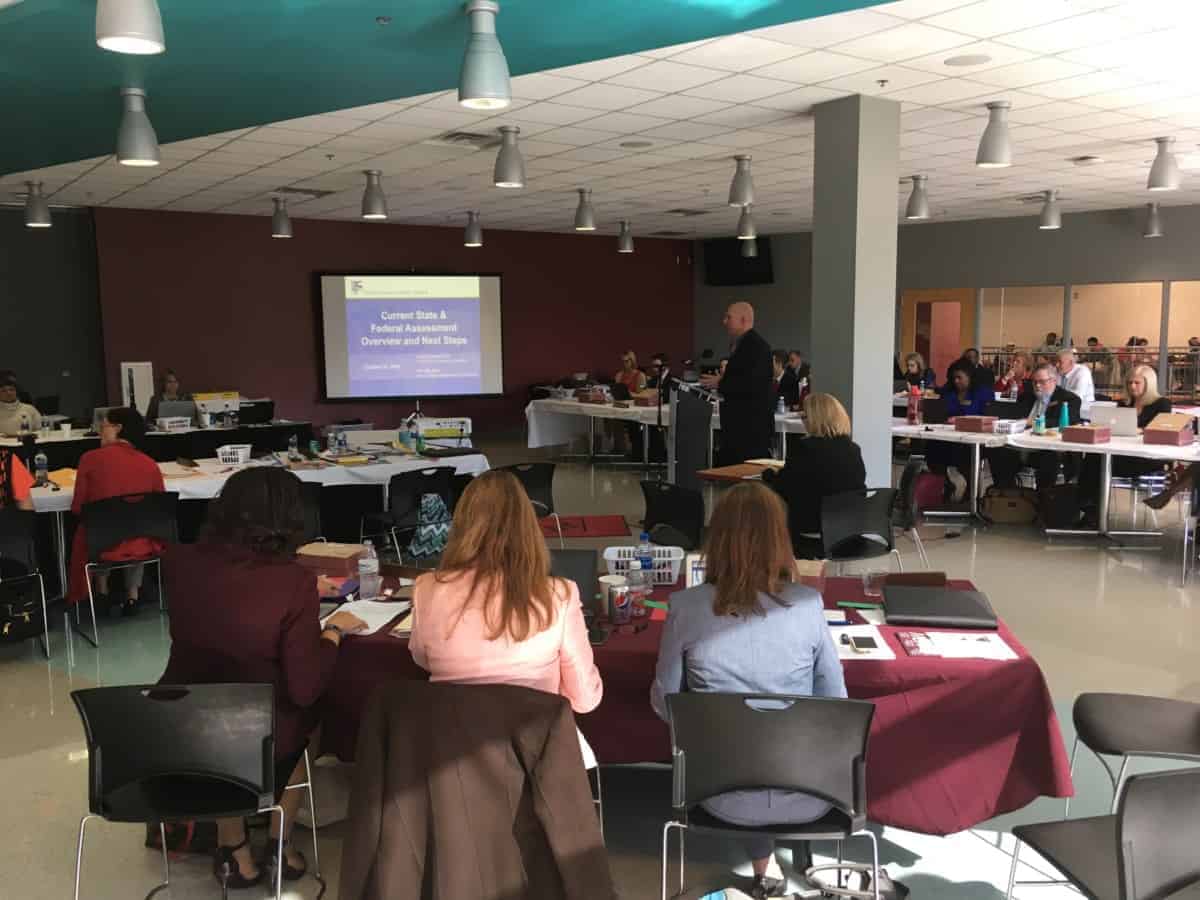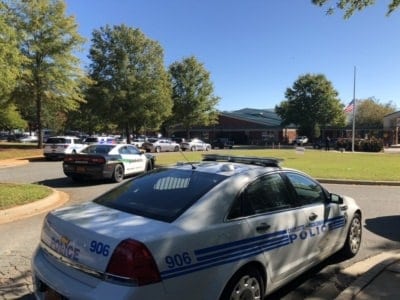The State Board of Education voted seven to five Thursday to delay a vote on the inclusion of Wayne County’s Carver Heights Elementary School into the Innovative School District (ISD).
The decision came after extensive discussion in which some Board members questioned the process by which Carver Heights had been picked by ISD leaders and the extent to which Goldsboro community members were engaged. The vote will now be held in December.
“This clearly is a difficult decision that this Board is grappling with,” said Superintendent Mark Johnson during the discussion on the school. “We have to make sure we get this right, so if there are Board members that feel they need more time to investigate this, then take more time, but please do investigate.”
Johnson indicated he supported inclusion of the school in the ISD.
The Achievement School District (ASD) bill was passed during the 2016 General Assembly short session. At the heart of the legislation is the creation of a district which will eventually include five low-performing schools from around the state. The schools could be turned over to for-profit charter management organizations.
The legislation establishing the ASD also gave districts that participate the opportunity to pick up to three other low-performing schools in their districts to join an innovation zone. Schools in this zone would have charter-like flexibility but would continue to be managed by the school district. Further tweaks to the program by the General Assembly changed its name to the North Carolina Innovative School District and added a provision that if a district participating in the ISD has more than 35 percent of its schools identified as low-performing, then all of those schools could become part of an innovation zone should the district elect that option.
Last year, Robeson County’s Southside Ashpole Elementary was picked to be the first school in the ISD. It started in the new district this fall under the operation of a non-profit charter management organization, Charlotte-based Achievement for All Children. If chosen, Carver Heights would join Southside Ashpole next fall in the ISD.
ISD Superintendent LaTeesa Allen along with the State Department of Public Instruction’s Deputy State Superintendent for Innovation (and former ISD superintendent) Eric Hall went through the process by which Carver Heights was picked.
They explained that they started with the statutory requirements, picking schools that were in the lowest five percent of all schools for academic performance in the last year and did not exceed growth or meet growth in at least one of the last three years.
The schools they looked at also couldn’t have adopted another reform model in the last school year, could not come from the same district, and had to be a mix of urban and rural schools.
Further winnowing down the list, they removed all schools that got a D or an F last year but met growth. In addition, any school that met growth in both 2015-16 and 2016-17 and earned a D both years was removed.
That left the state with six schools to choose from.
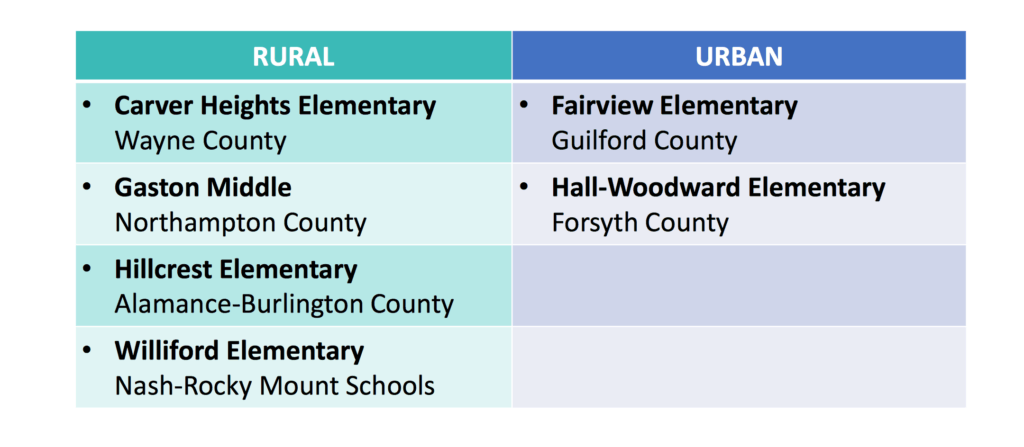

Looking at those six schools, Hall and Allen said they looked at academic growth and performance for the past three years, looked at the schools’ Comprehensive Needs Assessments, talked with district leaders, visited the schools and talked to staff, and considered whether the schools already had improvement plans in place.
After doing all that and looking at the data from the schools side by side, Hall and Allen made their decision.
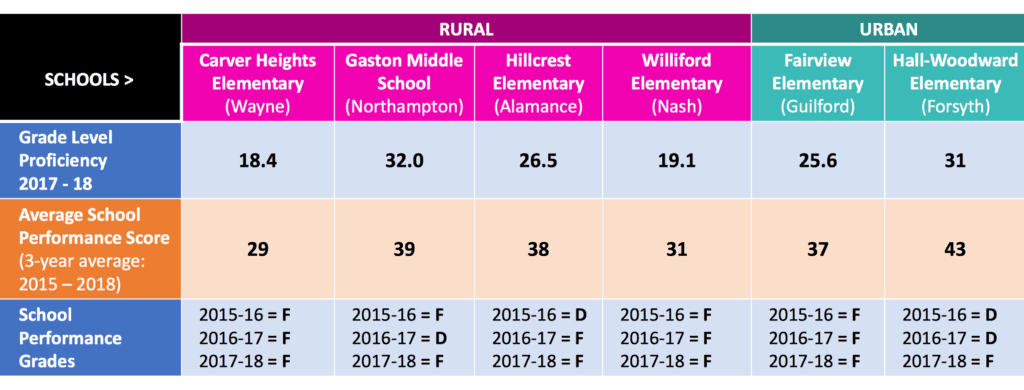

“As you see this chart, you will see that the lowest score is Carver Heights Elementary,” Hall said.
In addition to the data, when looking at plans for improvement, Hall said the other schools had more robust strategies already in place whereas Carver Heights faced “barriers” that had thus far prevented it from moving in the right direction.
He also pointed out that the school had almost $319,000 in available funds last year from a School Improvement Grant but hadn’t met seven of the eight goals of the grant and hadn’t used about $185,000 of the money available.
Wayne County is under the leadership of Superintendent Michael Dunsmore, who has shown success turning around low-performing schools, particularly through the use of the Restart model which grants charter-like flexibility to traditional schools.
“My concern is not with the superintendent,” said Johnson when asked for his input. “My concern is that there are other self-reported barriers that may exist in this district.”
But the takeover has faced vocal opposition from community members in Goldsboro, a contingent of whom were in the room on Thursday shaking their heads and sometimes interjecting audibly when they thought Allen was misrepresenting something about Carver Heights.
Board member Reginald Kenan initially proposed the idea of delaying the vote on Carver Heights by a month. The school is in his district and he said he had talked with the district superintendent and staff of the school. He indicated that he received new information that led him to think a delay was necessary.
“I think it would be very important to delay, do the vote in December, allow the community to have more time to understand this,” he said.
The community engagement aspect of the process was a particular sticking point. Hall and Allen were only able to begin to compile their list after school accountability data was released in September. With a statutory requirement that the State Board make a decision by December 15th, they didn’t have long to delay.
They held a town hall meeting in Goldsboro in October only days before they decided on Carver Heights as their pick. That was the only public opportunity residents had to voice their concerns or ask questions.
That was the part that gave new State Board member James Ford the “most pause.”
“Is there a way … for there to be more touch points, more robust listening and engagement?” he asked.
Board member Patricia Willoughby told Hall that she thought the process for picking Southside Ashpole was “more deliberate” last year, and said he developed better relationships with the community in Robeson County.
“You don’t have community support there,” she said of Goldsboro.
Hall replied that much of the positive engagement in Robeson County came after the State Board picked Southside Ashpole, not before.
Board member JB Buxton said he would have liked to have more data showing all the improvements the different schools were trying to make. He said that would have made it easier to understand why Hall and Allen chose Carver Heights over the other five schools.
“I want to be convinced that the Carver Heights kids are the best one choice,” he said.
Johnson said he recognized the problems with the timeline the ISD has to work under and said he and Hall were working with the General Assembly to get changes made. He agreed there needed to be time for more community engagement before the State Board has to vote moving forward. He also pointed out that the operator who takes over a school doesn’t necessarily have to be a for-profit charter or education management organization. The ISD itself can be a charter-school operator, as could a principal with a strong track record of turning around low-performing schools or universities or other entities.
Board member Olivia Oxendine said that if someone walked into the State Board meeting and saw the data on the six schools, they would have a hard time understanding why the Board was belaboring the discussion.
“Why is this Board splitting hairs over failure?” she asked.
Board member Amy White said that the discussion today might be less reflective of the actual choice the State Board was faced with than the limitations they have when making that choice.
“What you heard today is perhaps some discontent about the law itself,” she said.
Budget discussion
The State Board also approved an almost $191 million expansion budget request in advance of the long session of the General Assembly in the Spring. The request was made at the behest of Gov. Roy Cooper, who is collecting budgets from all departments in preparation for creating his own recommended 2019-2021 budget plan. He asked departments to limit their expansion budget to two percent growth.
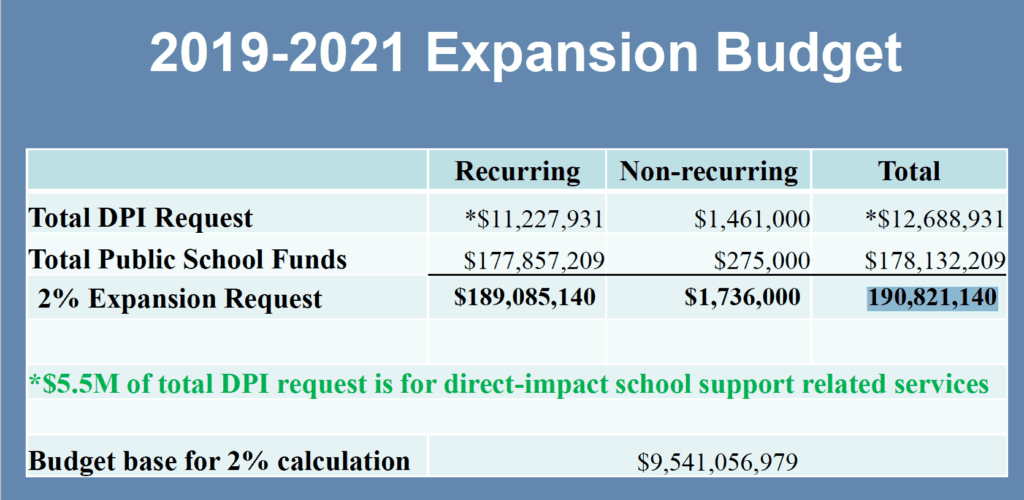

Principal and teacher pay is not included in this request and will be funded above and beyond the two percent budget increase.
One of the big asks in the budget request is about $71.5 million for school support and safety positions. These are school psychologists, counselors, nurses, resource officers, and others. The Board saw a chart showing how far off the mark the state is from reaching national recommendations for staffing in these areas. It would cost about $688 million to bring North Carolina in line with those recommendations.
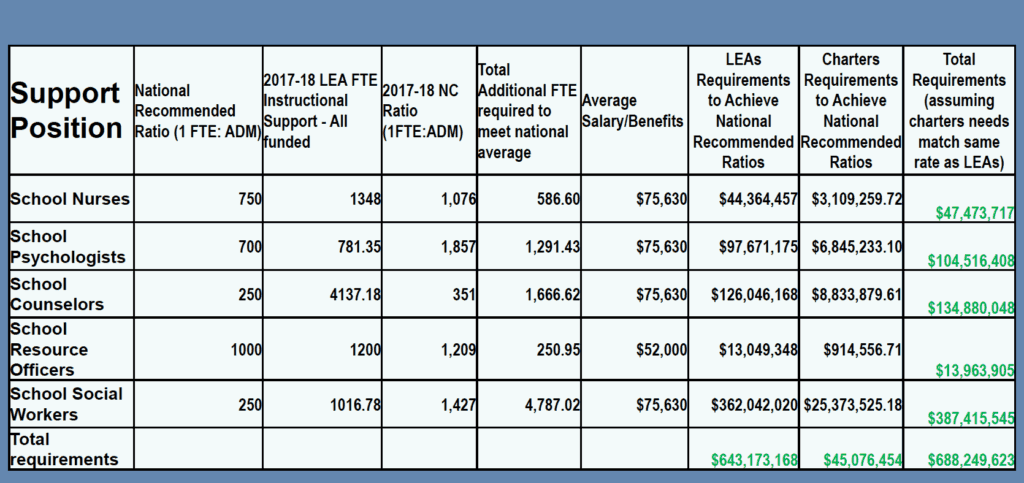

The $71.5 million request is an attempt to start the state on track to meet those recommendations.
The State Board also heard about and discussed non-budget items that will be part of their priorities for the long session during Wednesday’s planning session and Thursday’s meeting. These include creating a focus group to look at the best formula for school performance grades. Currently, they are composed of academic growth and achievement with 80 percent of the grade coming from the latter. The Board would also ask that the 15-point scale used for the school performance grades not become a 10-point scale next year, which is what would happen under the law as currently written.
The Board is also asking to extend the hold harmless provision under the principal pay scale. Under the new principal pay scale some principals would lose money when compared to the old pay schedule. The hold harmless stops that from happening but is not indefinite. Board members are also asking for lawmakers to change the definition of low-performing schools so that those that meet growth don’t qualify, and they want to eliminate a requirement in law that schools that are in innovation zones enter the Innovative School District if they are not successful.
Below are the non-budget related State Board priorities.
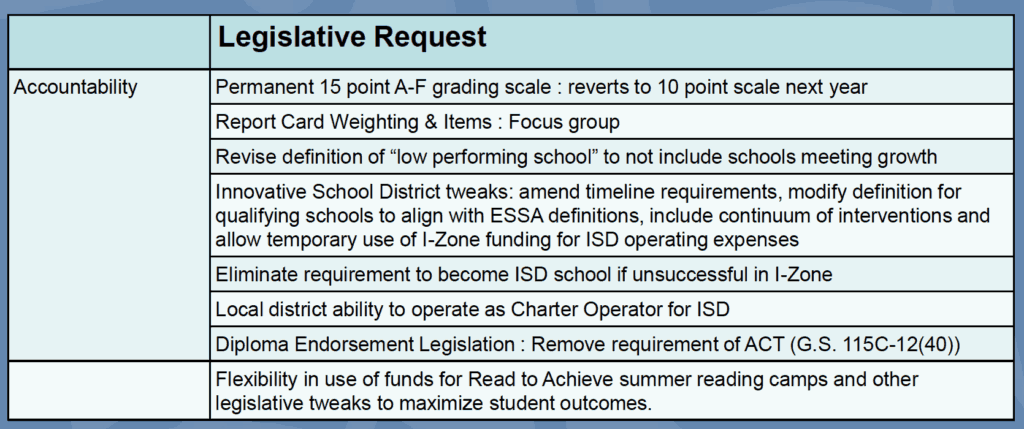



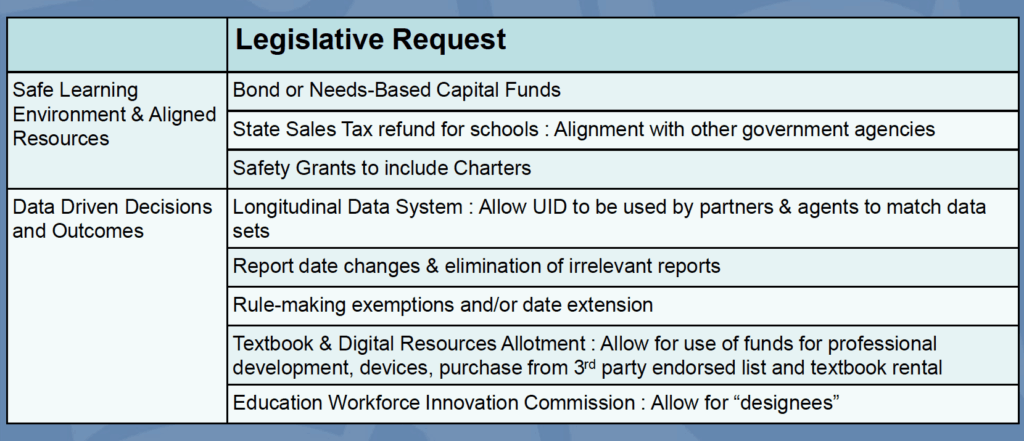

The State Board will also ask for a state sales tax refund for public schools, a subject that State Treasurer Dale Folwell was particularly passionate about Thursday.
He mentioned that Nascar, counties, and many others get sales tax refunds already.
“The thing we love the most is public schools, and they don’t receive it,” he said. “It is absolutely unexplainable as to why these other entities receive a refund of their sales taxes and public schools don’t.”
He said this policy was particularly harmful to rural school districts that don’t have the extra resources often found in metropolitan areas.
Here is the complete budget request:
Testing
During Wednesday’s planning session of the State Board, members discussed and heard a presentation about assessments in North Carolina and the possibilities of eliminating or streamlining them.
Tammy Howard, director of accountability services at DPI, and Hall presented on the topic, laying out which tests are required by the federal government, which by the state, and what wiggle room North Carolina has as it tries to lessen the burden on students.
There isn’t much North Carolina can do with tests required under federal law. They can’t be eliminated, though they could be tweaked.
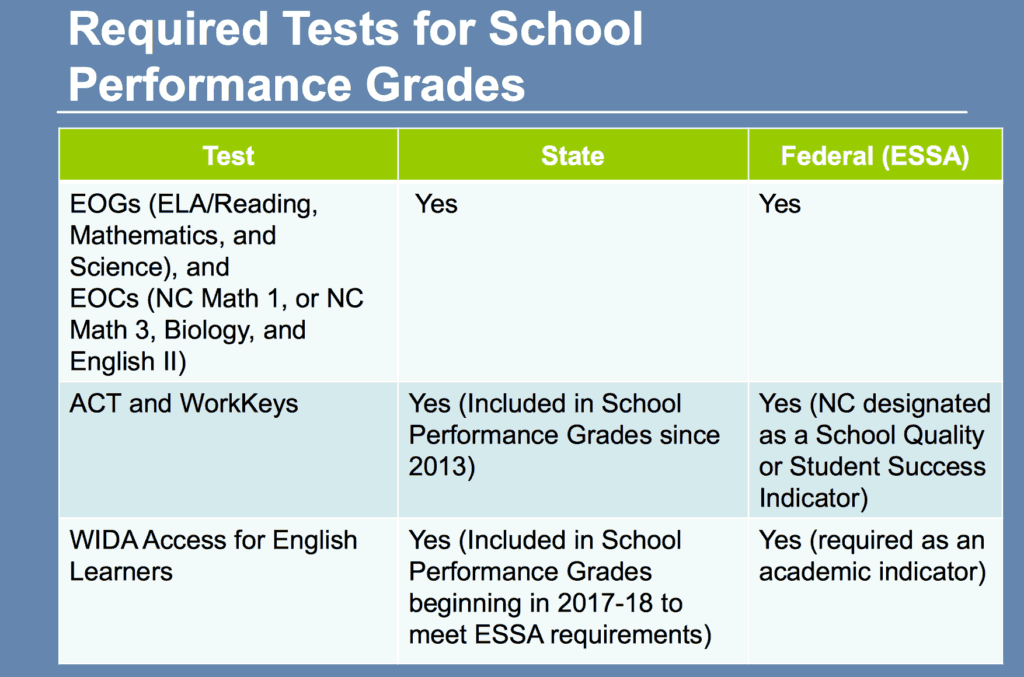

There is more possibility for change under tests required by the state alone. However, there are challenges. Some tests are necessary to determine teacher growth scores while others are required under state law. Some, like the Beginning-of-Grade 3 test were actually developed because local educators were asking for it. Since they had to get their kids up to snuff in reading by the end of the year under Read to Achieve, they wanted to know what their kids’ academic needs were at the start of the year as well.
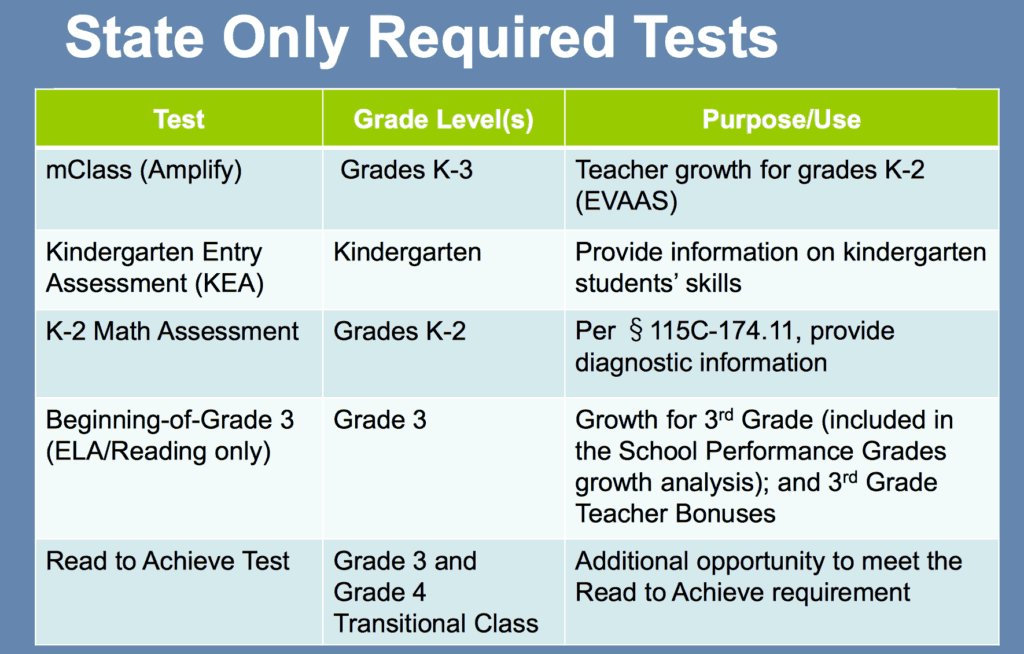

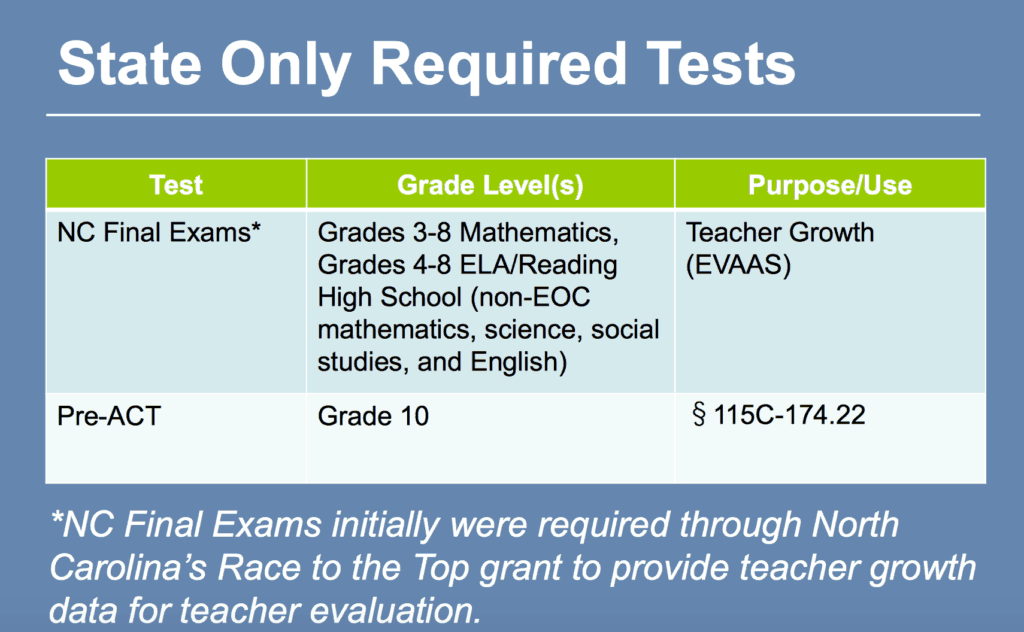

Howard, Hall, and the Board discussed complaints that tests take too long, cause too much stress to students, and happen too often. They talked about the possibility of having more coordination between the state and local districts to make sure that state tests do not duplicate the efforts of local tests and vice versa.
At the moment the conversation is preliminary. Hall said these are the things that he and his team are thinking about as they start to consider how they might change the testing landscape in North Carolina going forward.
Editor’s Note:
The NC Center for Public Policy Research has a contract with James Ford’s consulting company, Filling the Gap Education Consultants, LLC, to conduct a three-year study of inequity in education across North Carolina.
JB Buxton is former member of EducationNC’s Board of Directors.
Correction: This article originally stated that Charlotte-based Achievement for All Children is a for-profit charter management organization. That is incorrect. Achievement for All Children is a non-profit.
